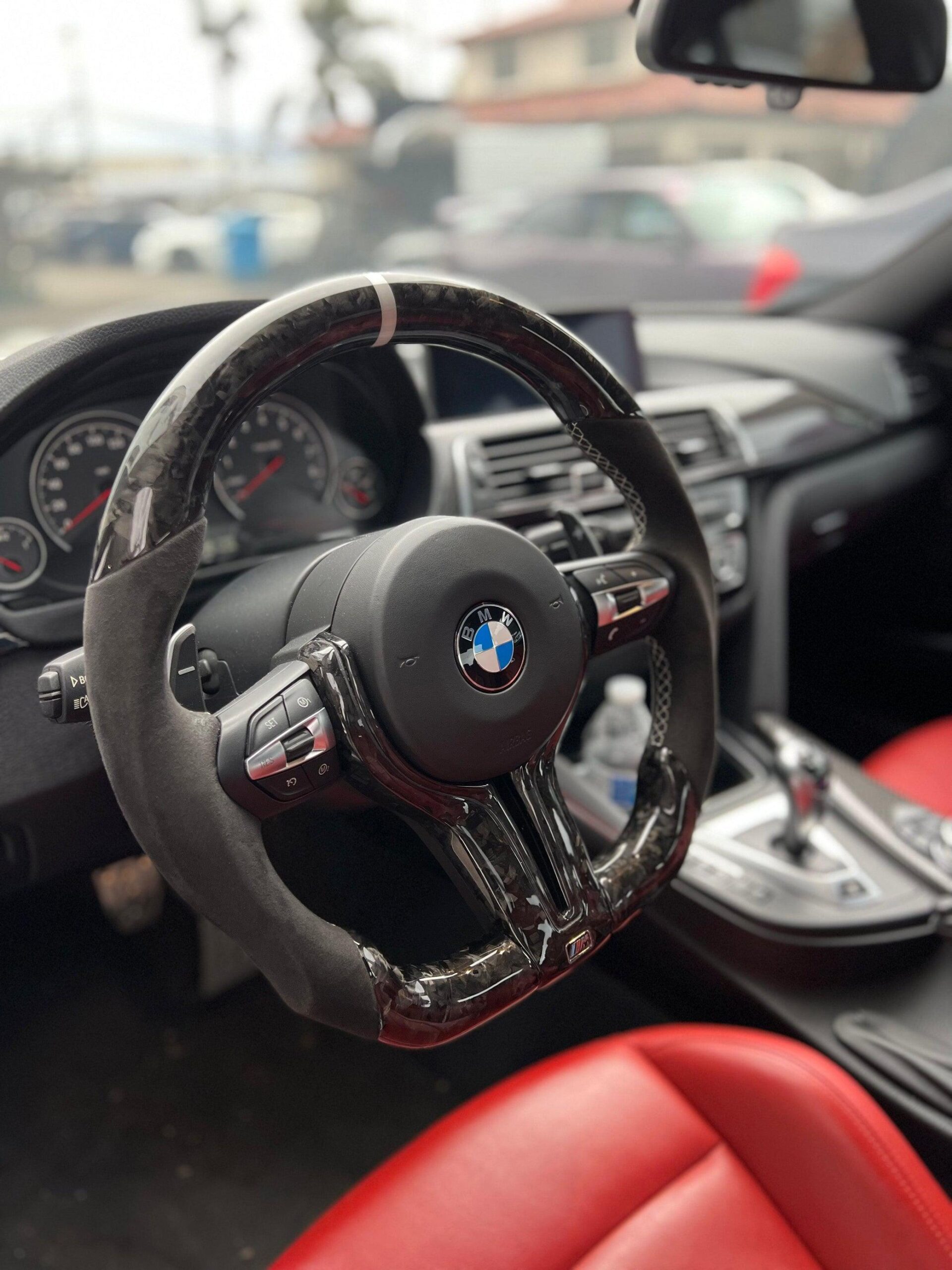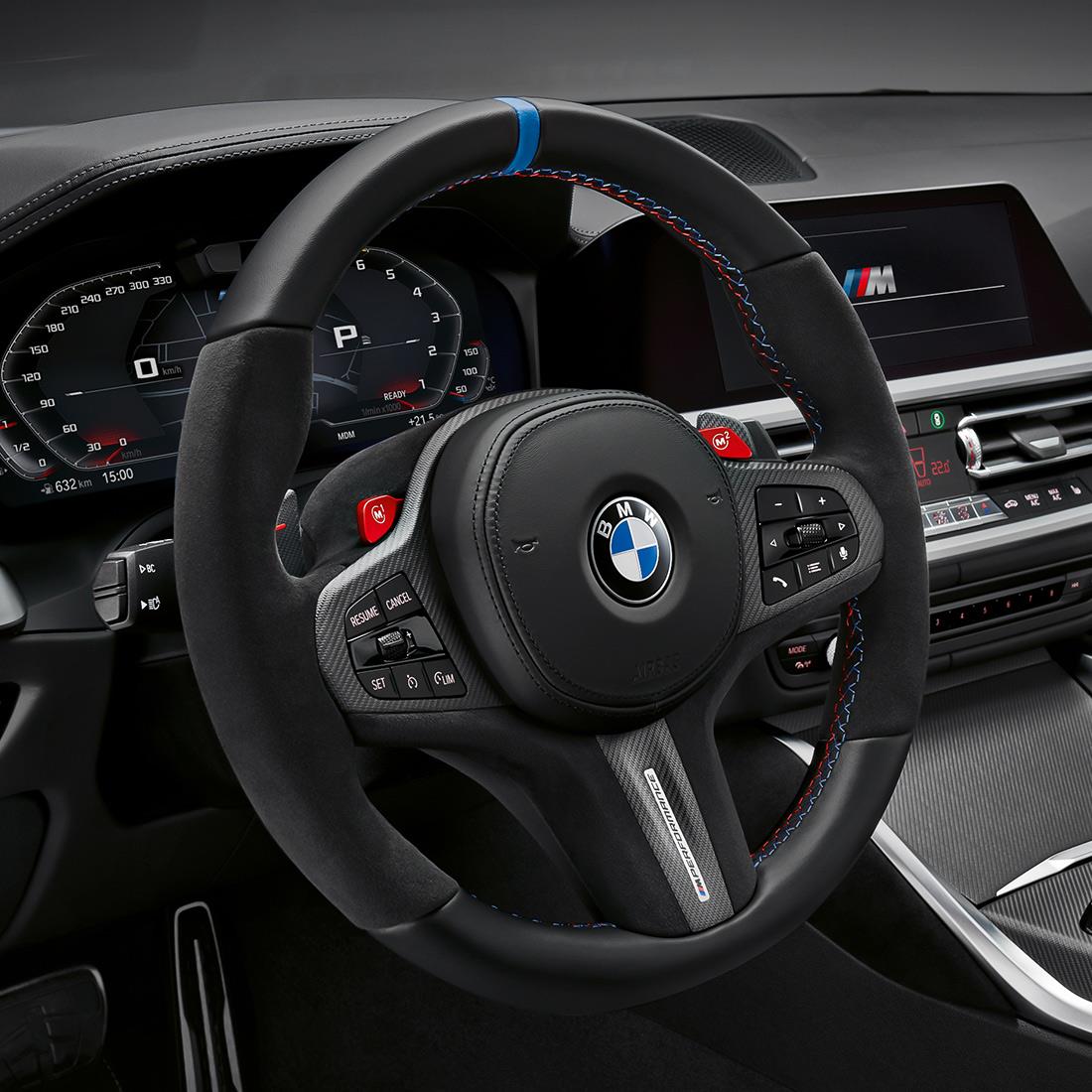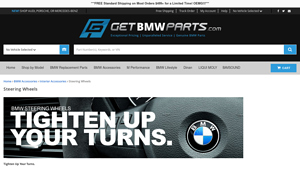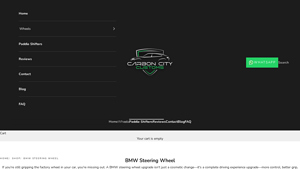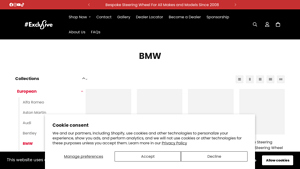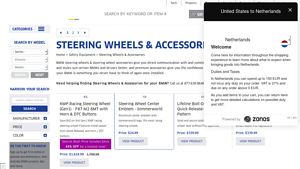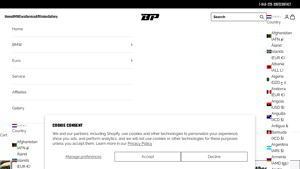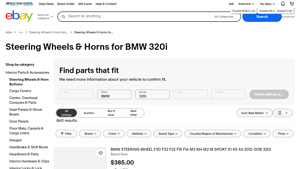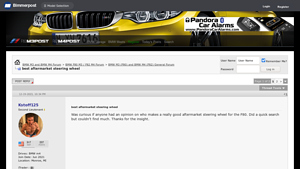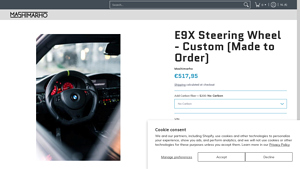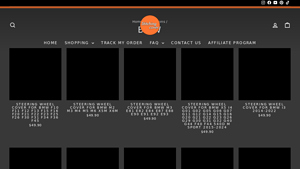Bmw Steering Wheel Guide: Type,Cost,Material…
Introduction: Navigating the Global Market for bmw steering wheel
As global markets become increasingly interconnected, sourcing high-quality BMW steering wheels poses a unique challenge for international B2B buyers. The demand for superior automotive accessories, particularly in regions such as Africa, South America, the Middle East, and Europe—including key markets like Germany and Saudi Arabia—necessitates a thorough understanding of product specifications, supplier reliability, and cost-effectiveness. This comprehensive guide aims to navigate the complexities of the BMW steering wheel market, providing insights into various types, applications, and critical factors for supplier vetting.
In this guide, we will explore the diverse range of steering wheel options, from M Performance models to standard designs, ensuring that buyers can meet both aesthetic and functional requirements. We will delve into the importance of compatibility with different BMW models, warranty considerations, and the potential for customization. Additionally, the guide will address pricing structures, shipping logistics, and the nuances of international trade regulations that affect procurement.
Equipped with this knowledge, B2B buyers will be empowered to make informed purchasing decisions, ultimately enhancing their product offerings and improving customer satisfaction. Whether you are a dealership looking to expand your inventory or a retailer aiming to meet specific consumer demands, this guide serves as a vital resource to help you successfully navigate the global market for BMW steering wheels.
Understanding bmw steering wheel Types and Variations
| Type Name | Key Distinguishing Features | Primary B2B Applications | Brief Pros & Cons for Buyers |
|---|---|---|---|
| M Performance Steering Wheel | Enhanced grip, flat-bottom design, premium materials | Performance vehicles, motorsport | Pros: Improved handling, sporty aesthetics. Cons: Higher cost, may require specific vehicle compatibility. |
| Electronic Steering Wheel | Integrated technology, shift indicator lights, customizable | Luxury vehicles, tech-focused markets | Pros: Modern features, improved driver engagement. Cons: Complex installation, potential for electronic issues. |
| Alcantara Steering Wheel | Soft-touch material, superior grip in extreme conditions | High-performance and racing vehicles | Pros: Excellent grip, stylish appearance. Cons: Requires regular maintenance, susceptible to wear. |
| Standard OEM Steering Wheel | Basic design, functional features, cost-effective | General market vehicles | Pros: Affordable, widely available. Cons: Limited customization, less sporty feel. |
| Sport Line Steering Wheel | Sportier design, additional grip features, often leather-wrapped | Mid-range performance vehicles | Pros: Balanced performance and comfort. Cons: May lack advanced features found in premium options. |
What Are the Key Characteristics of M Performance Steering Wheels?
M Performance Steering Wheels are designed for enthusiasts seeking enhanced control and aesthetics. Featuring a flat-bottom design and high-quality materials, these wheels provide superior grip during high-speed maneuvers. They are ideal for performance vehicles and motorsport applications, where handling precision is paramount. When purchasing, consider compatibility with specific BMW models and the potential for higher costs compared to standard options.
How Do Electronic Steering Wheels Enhance Driving Experience?
Electronic Steering Wheels integrate advanced technology, including shift indicator lights and customizable features. These wheels are particularly suited for luxury and tech-focused markets, appealing to buyers who prioritize modernity and engagement in driving. However, B2B buyers should assess installation complexity and potential electronic malfunctions, which may require specialized service.
Why Choose Alcantara Steering Wheels for Performance Vehicles?
Alcantara Steering Wheels are favored in high-performance and racing vehicles due to their soft-touch material, which enhances grip in extreme conditions. Their stylish appearance adds a premium feel to the interior. B2B buyers should consider the need for regular maintenance to preserve the material’s integrity and be aware that while they offer excellent performance, they may be prone to wear over time.
What Benefits Do Standard OEM Steering Wheels Offer?
Standard OEM Steering Wheels provide functional features at a more affordable price point, making them a popular choice for general market vehicles. They are widely available and compatible with various models, appealing to cost-conscious buyers. However, they lack the sporty feel and customization options found in performance-oriented alternatives, which may not satisfy enthusiasts.
How Does the Sport Line Steering Wheel Balance Performance and Comfort?
Sport Line Steering Wheels offer a sportier design and additional grip features while maintaining comfort for everyday driving. These wheels are often leather-wrapped, appealing to mid-range performance vehicle buyers. When considering a purchase, evaluate the balance between performance enhancements and comfort, as well as the potential for limited advanced features compared to higher-end options.
Key Industrial Applications of bmw steering wheel
| Industry/Sector | Specific Application of BMW Steering Wheel | Value/Benefit for the Business | Key Sourcing Considerations for this Application |
|---|---|---|---|
| Automotive Manufacturing | Customization of BMW models with M Performance wheels | Enhances vehicle performance and aesthetic appeal | Compatibility with specific BMW models, warranty, and quality assurance. |
| Luxury Vehicle Rentals | Upgrading fleet vehicles with premium steering wheels | Attracts high-end clientele and improves user experience | Sourcing from authorized dealers, ensuring authenticity and quality. |
| Motorsports | Use of performance steering wheels in racing vehicles | Improves handling and driver control in competitive settings | Regulations compliance, durability under extreme conditions, and performance specifications. |
| Automotive Aftermarket | Retailing BMW steering wheels as aftermarket accessories | Provides additional revenue streams and customer satisfaction | Availability of various designs and materials, competitive pricing, and installation support. |
| Automotive Restoration | Replacing or refurbishing vintage BMW steering wheels | Preserves vehicle value and enhances collector appeal | Authenticity verification, sourcing of compatible parts, and restoration services. |
What Are the Key Applications of BMW Steering Wheels in the Automotive Industry?
In the automotive manufacturing sector, BMW steering wheels, particularly M Performance models, are often utilized for customizing vehicles. This application allows manufacturers to enhance both the performance and aesthetic appeal of their cars, appealing to performance enthusiasts. Buyers should consider compatibility with specific BMW models, warranty options, and quality assurance when sourcing these components to ensure they meet rigorous standards.
How Do Luxury Vehicle Rentals Benefit from BMW Steering Wheels?
Luxury vehicle rental companies frequently upgrade their fleets with premium BMW steering wheels to enhance the driving experience for high-end clientele. This not only improves the overall luxury feel of the vehicle but also attracts discerning customers who seek an elevated driving experience. When sourcing these steering wheels, companies should prioritize sourcing from authorized dealers to ensure authenticity and quality, which are critical for maintaining brand reputation.
In What Ways Are BMW Steering Wheels Used in Motorsports?
In motorsports, BMW steering wheels are essential for improving vehicle handling and driver control. Performance steering wheels are designed to provide superior grip and responsiveness, which are crucial during competitive racing. For teams and organizations in this sector, it’s important to consider compliance with racing regulations, the durability of materials under extreme conditions, and specific performance specifications when sourcing these products.
What Role Do BMW Steering Wheels Play in the Automotive Aftermarket?
The automotive aftermarket sector leverages BMW steering wheels as popular accessories for vehicle customization. Retailers can provide a variety of steering wheel designs and materials, catering to different customer preferences. Key considerations for sourcing include availability of diverse options, competitive pricing, and the ability to offer installation support, which can enhance customer satisfaction and loyalty.
How Are BMW Steering Wheels Essential in Automotive Restoration?
In automotive restoration, particularly for vintage BMW models, steering wheels play a vital role in preserving the vehicle’s value and enhancing its appeal to collectors. Restorers often seek authentic or high-quality replacements that match the original specifications. Buyers should focus on authenticity verification, sourcing compatible parts, and considering restoration services to maintain the integrity of the vehicle.
3 Common User Pain Points for ‘bmw steering wheel’ & Their Solutions
Scenario 1: Sourcing Genuine BMW Steering Wheels for Fleet Vehicles
The Problem: B2B buyers managing a fleet of BMW vehicles often face the challenge of sourcing genuine steering wheels that are compatible with various models. The risk of purchasing counterfeit or non-compatible parts is high, especially when dealing with multiple suppliers in different regions. This can lead to costly downtime if parts are incorrect or fail to meet quality standards, impacting fleet operations and customer satisfaction.
The Solution: To effectively source genuine BMW steering wheels, buyers should establish a direct relationship with authorized BMW dealerships or certified parts distributors. Utilizing the vehicle identification number (VIN) for each BMW in the fleet can significantly streamline the process, ensuring that the parts ordered are specifically compatible with each vehicle model. Additionally, implementing a centralized procurement system that tracks inventory levels and supplier performance can help maintain consistent quality and minimize risks. Consider negotiating volume discounts with suppliers to enhance cost-effectiveness while ensuring that all steering wheels meet BMW’s stringent quality standards.
Scenario 2: Customization and Performance Upgrades for Client Vehicles
The Problem: Many B2B buyers, particularly those in the automotive service industry, encounter difficulties when attempting to customize or upgrade steering wheels for clients seeking enhanced performance or aesthetic appeal. The challenge lies in balancing client preferences with the technical specifications of BMW vehicles, which can lead to miscommunication and unmet expectations.
The Solution: To address this pain point, buyers should invest in thorough training for their sales and service teams on the various BMW steering wheel options available, including M Performance and customized designs. By offering clients a range of choices, such as materials (e.g., Alcantara, carbon fiber) and features (e.g., shift indicators, flat-bottom designs), service providers can tailor solutions that align with their clients’ desires. Utilizing visual aids, such as catalogs or digital tools that showcase customization options, can enhance client engagement and satisfaction. Furthermore, establishing a feedback loop to gather client preferences and experiences can help refine future offerings and strengthen relationships.
Scenario 3: Ensuring Quality and Safety Compliance in Replacement Parts
The Problem: B2B buyers in the automotive repair sector often struggle with ensuring that replacement steering wheels comply with safety and quality regulations. This is especially crucial in regions with strict automotive safety standards, where using substandard parts can lead to legal repercussions and damage to a company’s reputation.
The Solution: To mitigate this risk, buyers should prioritize sourcing steering wheels from reputable suppliers that provide certification of compliance with local safety regulations. Conducting regular audits of suppliers and requiring documentation for parts can help ensure that only high-quality products are used in repairs. Additionally, implementing a robust quality control process that includes testing steering wheels for performance and safety before installation can safeguard against potential failures. Keeping abreast of changes in automotive safety regulations and industry standards in the target markets can further enhance compliance efforts and build trust with customers. Providing transparent information about the quality standards of the parts used can also serve as a strong selling point, reassuring clients of their commitment to safety and excellence.
Strategic Material Selection Guide for bmw steering wheel
What Are the Key Materials Used in BMW Steering Wheels?
When selecting materials for BMW steering wheels, several options are commonly utilized, each with distinct properties and implications for performance, durability, and cost. Understanding these materials is crucial for international B2B buyers, especially when considering regional standards and preferences.
How Does Leather Perform in BMW Steering Wheels?
Leather is a traditional choice for BMW steering wheels, renowned for its aesthetic appeal and comfort. It offers a high level of grip, which is essential for vehicle control. Key properties include good temperature resistance and a natural ability to absorb moisture, preventing slippage during use. However, leather can be sensitive to extreme temperatures and may require regular maintenance to prevent wear and tear.
Pros: Leather provides a luxurious feel, excellent grip, and is relatively easy to clean. It also allows for customization in terms of color and texture.
Cons: The main drawbacks include higher costs and susceptibility to damage from UV exposure and extreme temperatures. Leather steering wheels may not be suitable for all environments, particularly in regions with high humidity or extreme heat.
For buyers in regions like Africa and the Middle East, where temperatures can soar, it’s vital to consider the long-term durability of leather in such climates.
What Are the Benefits of Alcantara in Steering Wheel Design?
Alcantara, a synthetic material, has gained popularity in high-performance vehicles, including BMW models. It is known for its soft texture and excellent grip, making it ideal for sporty applications. Alcantara is also resistant to fading and offers good temperature stability, which is beneficial in varying climates.
Pros: This material is lightweight, provides excellent tactile feedback, and is less slippery than leather. Its durability against wear and tear makes it suitable for high-performance driving.
Cons: Alcantara can be more expensive than traditional materials and may require specific cleaning products to maintain its appearance. It is also less resistant to moisture, which could be a concern in humid regions.
For international buyers, particularly in Europe, Alcantara may align well with preferences for performance and aesthetics, but its care requirements should be considered.
How Does Carbon Fiber Enhance BMW Steering Wheels?
Carbon fiber is increasingly being used in BMW steering wheels, especially in performance-oriented models. This material is incredibly strong yet lightweight, contributing to improved vehicle dynamics. Carbon fiber’s resistance to corrosion and high-temperature stability makes it a favorable choice for high-performance applications.
Pros: The primary advantage of carbon fiber is its strength-to-weight ratio, which enhances vehicle performance. It also offers a modern, high-tech appearance.
Cons: The cost of carbon fiber is significantly higher than other materials, and its manufacturing process can be complex and time-consuming. Additionally, it may not provide the same tactile comfort as leather or Alcantara.
For buyers in South America and Europe, where performance is a priority, carbon fiber steering wheels can be a compelling option, though the investment must be justified by the intended application.
What Role Does Plastic Play in Steering Wheel Manufacturing?
Plastic, particularly high-quality polymers, is often used in the core structure of steering wheels. It provides a lightweight and cost-effective solution, allowing for mass production. Plastics can be engineered to offer specific properties such as UV resistance and impact resistance.
Pros: The affordability and ease of manufacturing make plastic a practical choice for many applications. It can also be molded into various shapes and sizes, accommodating diverse design needs.
Cons: Plastic may not provide the same premium feel or aesthetic appeal as leather or Alcantara. It is also less durable over time, especially in harsh environments.
For international buyers, especially in developing markets, the cost-effectiveness of plastic can be appealing, but they should weigh this against the potential need for replacements or repairs.
Summary of Material Selection for BMW Steering Wheels
| Material | Typical Use Case for BMW Steering Wheel | Key Advantage | Key Disadvantage/Limitation | Relative Cost (Low/Med/High) |
|---|---|---|---|---|
| Leather | Luxury and comfort-focused models | Luxurious feel and excellent grip | Higher maintenance and cost | High |
| Alcantara | Performance and sporty models | Lightweight and excellent tactile feedback | Requires specific cleaning products | Medium |
| Carbon Fiber | High-performance applications | Strong and lightweight | High cost and complex manufacturing | High |
| Plastic | Mass-produced models | Cost-effective and easy to manufacture | Less durable and premium feel | Low |
This guide serves as a foundational resource for international B2B buyers, enabling informed decisions based on material properties, performance requirements, and regional considerations.
In-depth Look: Manufacturing Processes and Quality Assurance for bmw steering wheel
What Are the Key Stages in the Manufacturing Process of BMW Steering Wheels?
The manufacturing of BMW steering wheels involves several critical stages that ensure both performance and aesthetic appeal. Understanding these stages can help B2B buyers make informed decisions when sourcing steering wheels.
-
Material Preparation
The manufacturing process begins with the careful selection and preparation of materials. Common materials include high-quality plastics, aluminum, and various types of leather or Alcantara for the steering wheel covers. Suppliers often utilize advanced materials that enhance durability and tactile feedback. Material quality is essential, as it directly impacts the steering wheel’s performance and longevity. -
Forming
The forming process involves shaping the prepared materials into the desired steering wheel design. This can be achieved through techniques like injection molding for plastic components or CNC machining for metal parts. Advanced technologies such as 3D printing may also be utilized for prototyping or producing complex geometries. Precision in this stage is vital, as it ensures that all components fit together perfectly, which is crucial for safety and functionality. -
Assembly
After forming, the various components of the steering wheel are assembled. This includes integrating electronic components for features such as airbag deployment and steering wheel controls. The assembly process may involve automated systems for consistency and efficiency, but skilled labor is also crucial for quality assurance. Each steering wheel is meticulously assembled to ensure that all functionalities, including airbag systems and electronic controls, meet stringent safety and performance standards. -
Finishing
The final stage is finishing, where the steering wheel is coated or wrapped in premium materials such as leather or Alcantara. This not only enhances the aesthetic appeal but also improves grip and comfort. Finishing processes may include stitching, dyeing, and applying protective coatings to ensure durability against wear and environmental factors. Quality in this stage is critical, as it affects the overall customer experience and satisfaction.
What Quality Assurance Standards Are Relevant to BMW Steering Wheels?
Quality assurance is paramount in steering wheel manufacturing, especially in the automotive industry where safety is non-negotiable. Here are some of the international and industry-specific standards that govern the quality assurance process:
-
ISO 9001
This is one of the most recognized quality management standards worldwide. Compliance with ISO 9001 ensures that manufacturers maintain consistent quality in their processes, which is essential for B2B buyers looking for reliable suppliers. It covers all aspects of production, from design to delivery, ensuring that every steering wheel meets predefined quality criteria. -
CE Marking
For products sold in the European market, CE marking is mandatory. This indicates compliance with European health, safety, and environmental protection standards. B2B buyers in Europe should verify that their suppliers provide CE certification for steering wheels to ensure compliance with local regulations. -
API Standards
While primarily associated with the petroleum and natural gas industries, API standards can be relevant for certain components within steering systems. Understanding the specific API standards applicable to the materials and components used in steering wheels can further assure quality and reliability.
How Are Quality Control Checkpoints Implemented in BMW Steering Wheel Manufacturing?
Quality control (QC) checkpoints are integral to the manufacturing process of BMW steering wheels. These checkpoints help identify defects early and ensure that the final product meets all required specifications.
-
Incoming Quality Control (IQC)
This initial checkpoint occurs when raw materials and components arrive at the manufacturing facility. Suppliers conduct thorough inspections and tests to verify that materials meet specified standards before they are used in production. This step is crucial for preventing defects caused by substandard materials. -
In-Process Quality Control (IPQC)
During the manufacturing process, continuous monitoring is carried out at various stages. This includes visual inspections and measurements to ensure that components are being formed and assembled correctly. Any deviations from the set standards are addressed immediately, preventing further issues down the line. -
Final Quality Control (FQC)
Once the steering wheels are fully assembled, they undergo a final quality check. This includes rigorous testing for functionality, safety features (like airbag deployment), and aesthetic quality. It may involve stress testing, electronic testing, and inspections for finish quality to ensure that each unit meets BMW’s high standards.
What Testing Methods Are Commonly Used for BMW Steering Wheels?
Various testing methods are employed to ensure the quality and reliability of BMW steering wheels:
-
Durability Testing
Steering wheels are subjected to extensive durability tests that simulate real-world conditions. This includes exposure to extreme temperatures, UV light, and moisture to assess the longevity of materials and finishes. -
Functional Testing
This involves checking all electronic components, including buttons and airbag systems, to ensure they operate correctly. Functional tests are critical for verifying that the steering wheel meets safety and usability standards. -
Tactile Feedback Testing
Given the importance of driver experience, tactile feedback is assessed during testing. This ensures that the steering wheel provides the right level of grip and responsiveness, contributing to overall driving performance.
How Can B2B Buyers Verify Supplier Quality Control?
For B2B buyers, ensuring that suppliers adhere to stringent quality control practices is essential. Here are some methods to verify supplier QC:
-
Supplier Audits
Conducting audits of potential suppliers can provide insights into their manufacturing processes and quality control measures. Audits should assess compliance with international standards and the effectiveness of their QC checkpoints. -
Quality Reports
Requesting detailed quality reports from suppliers can help buyers understand how quality is managed throughout the manufacturing process. These reports should include data on defect rates, testing results, and corrective actions taken. -
Third-Party Inspections
Engaging third-party inspection services can provide an unbiased evaluation of supplier quality. These inspections can be performed at various stages of production, ensuring that suppliers meet their commitments regarding quality and compliance.
What Are the QC and Certification Nuances for International B2B Buyers?
B2B buyers from regions like Africa, South America, the Middle East, and Europe may encounter specific nuances regarding quality control and certification:
-
Regional Compliance
Understanding local regulations and compliance requirements is crucial. For example, buyers in Europe must ensure that suppliers meet CE marking requirements, while those in Africa may need to consider local standards that differ from international norms. -
Cultural Considerations
Cultural differences can affect communication and expectations regarding quality. Buyers should establish clear guidelines and expectations upfront to avoid misunderstandings. -
Documentation and Traceability
Ensure that suppliers provide complete documentation of quality control processes and certifications. This traceability can be vital for resolving any issues related to defects or non-compliance.
In summary, understanding the manufacturing processes and quality assurance practices for BMW steering wheels is essential for B2B buyers. By focusing on these aspects, buyers can ensure they are sourcing high-quality products that meet their specific needs and regulatory requirements.
Practical Sourcing Guide: A Step-by-Step Checklist for ‘bmw steering wheel’
The following guide serves as a comprehensive checklist for B2B buyers looking to procure BMW steering wheels. It outlines key steps to ensure a successful sourcing process, focusing on quality, compatibility, and supplier reliability.
Step 1: Define Your Technical Specifications
Before diving into the sourcing process, it’s essential to clarify your technical requirements. Determine the specific models and types of BMW steering wheels needed, such as M Performance or standard options. Consider factors like material (e.g., leather, Alcantara), features (e.g., paddle shifters, heating), and compatibility with various BMW models. This clarity will streamline communication with suppliers and help avoid costly mistakes.
Step 2: Research Reputable Suppliers
Identifying reliable suppliers is critical for ensuring quality and service. Conduct thorough research to compile a list of potential suppliers specializing in BMW parts and accessories. Look for suppliers with a solid reputation, positive customer feedback, and a proven track record in the automotive industry. Prioritize suppliers who offer genuine OEM parts, as these generally guarantee better fit and durability.
Step 3: Evaluate Supplier Certifications
Before finalizing your supplier, verify their certifications and compliance with industry standards. This includes checking if they hold relevant ISO certifications and any local automotive regulations specific to your region. Certifications not only reflect a commitment to quality but also provide assurance regarding the authenticity of the parts supplied.
Step 4: Request Product Samples
To assess the quality of the steering wheels, request samples before placing a bulk order. Inspect the samples for craftsmanship, material quality, and compatibility with your specified BMW models. A hands-on evaluation allows you to identify any discrepancies or potential issues that could affect performance and customer satisfaction.
Step 5: Understand Pricing and Payment Terms
Establish a clear understanding of the pricing structure and payment terms with your chosen suppliers. Inquire about bulk order discounts, shipping costs, and any additional fees that may apply. Clarity on payment terms, including deposit requirements and payment schedules, will help you manage your cash flow effectively and avoid unexpected expenses.
Step 6: Review Warranty and Return Policies
A robust warranty and flexible return policy are vital for safeguarding your investment. Ensure that the steering wheels come with a warranty that covers defects and guarantees the lifespan of the product. Familiarize yourself with the return policies in case the parts do not meet your expectations or fit your vehicles as intended.
Step 7: Establish Ongoing Communication
Once you have selected a supplier and placed your order, maintain open lines of communication. Regular updates on order status, delivery timelines, and inventory levels are crucial for effective supply chain management. Establishing a good relationship with your supplier can lead to better service and potential future collaborations, enhancing your procurement process.
By following this checklist, you will be well-equipped to make informed decisions when sourcing BMW steering wheels, ensuring both quality and compatibility for your business needs.
Comprehensive Cost and Pricing Analysis for bmw steering wheel Sourcing
What Are the Key Cost Components in Sourcing BMW Steering Wheels?
When analyzing the costs associated with sourcing BMW steering wheels, several critical components come into play:
-
Materials: High-quality materials such as Alcantara, leather, and carbon fiber are commonly used in BMW steering wheels. The choice of materials significantly impacts the overall cost, with premium materials typically leading to higher prices.
-
Labor: Skilled labor is required for the assembly of steering wheels, especially for models that include intricate designs or technology, such as electronic displays and shift indicators. Labor costs can vary based on geographic location and the complexity of the assembly process.
-
Manufacturing Overhead: This encompasses the indirect costs related to production facilities, equipment maintenance, and utilities. Efficient manufacturing processes can help mitigate these overhead costs.
-
Tooling: The initial setup costs for molds and tools necessary for producing specific steering wheel designs can be substantial. These costs are often amortized over the production volume, influencing the price per unit.
-
Quality Control (QC): Ensuring that each steering wheel meets BMW’s stringent quality standards incurs additional costs. These expenses include testing materials, monitoring production quality, and implementing corrective measures.
-
Logistics: Costs associated with transporting the finished products from manufacturers to distributors or directly to buyers can vary greatly depending on distance, shipping methods, and Incoterms agreed upon in contracts.
-
Margin: Suppliers will typically include a profit margin in their pricing structure, which can fluctuate based on market demand, competition, and the supplier’s operational costs.
How Do Price Influencers Affect BMW Steering Wheel Costs?
Several factors can influence the pricing of BMW steering wheels:
-
Volume and Minimum Order Quantity (MOQ): Larger orders usually result in lower per-unit costs due to economies of scale. Negotiating favorable MOQs can help international buyers achieve cost efficiencies.
-
Specifications and Customization: Custom features, such as unique designs or specific material choices, can significantly increase costs. Buyers should clearly communicate their specifications to avoid unexpected pricing.
-
Material Quality and Certifications: The choice of materials and any necessary certifications (e.g., safety standards) can affect costs. Higher-quality materials may be more expensive but can offer better durability and customer satisfaction.
-
Supplier Factors: The reputation and reliability of suppliers can impact pricing. Established suppliers with a history of quality assurance may charge more but provide better service and fewer defects.
-
Incoterms: Understanding the agreed-upon Incoterms is crucial for calculating total costs, as these terms define responsibilities regarding shipping, risk, and customs duties.
What Are Effective Buyer Tips for Cost-Efficiency in BMW Steering Wheel Sourcing?
For international B2B buyers, particularly in regions like Africa, South America, the Middle East, and Europe, the following strategies can enhance cost-efficiency:
-
Negotiate Prices and Terms: Engage in negotiations with multiple suppliers to compare prices and terms. Leverage volume commitments or long-term contracts to secure better rates.
-
Consider Total Cost of Ownership (TCO): Evaluate not just the purchase price but the TCO, which includes maintenance, potential warranty claims, and resale value. This holistic view can guide better investment decisions.
-
Be Aware of Pricing Nuances: Different regions may have varying pricing structures due to local market conditions, import tariffs, and currency fluctuations. Researching these factors can help in making informed decisions.
-
Establish Strong Relationships with Suppliers: Building rapport with suppliers can lead to better pricing, improved service levels, and priority in inventory availability, especially for custom or high-demand items.
Disclaimer on Indicative Prices
Prices for BMW steering wheels can fluctuate based on various factors, including market conditions, supplier pricing strategies, and specific customization requests. Buyers are encouraged to obtain quotes directly from suppliers to ensure accurate and up-to-date pricing information.
Alternatives Analysis: Comparing bmw steering wheel With Other Solutions
Introduction: Exploring Alternatives to BMW Steering Wheels
When considering steering wheel solutions, it’s essential for B2B buyers to evaluate various options that may better suit their specific operational requirements or budget constraints. The BMW steering wheel, renowned for its performance and design, has several alternatives that cater to different needs. This analysis will compare the BMW steering wheel with two viable alternatives: the aftermarket performance steering wheel and the universal steering wheel, assessing their performance, cost, ease of implementation, maintenance, and best use cases.
Comparison Table
| Comparison Aspect | BMW Steering Wheel | Aftermarket Performance Steering Wheel | Universal Steering Wheel |
|---|---|---|---|
| Performance | High precision and responsiveness | Enhanced grip and customizable features | Varies significantly by brand |
| Cost | $1,000 – $2,000 | $300 – $800 | $100 – $300 |
| Ease of Implementation | Requires professional installation | Relatively easy to install | Simple installation process |
| Maintenance | Minimal, OEM quality assurance | Moderate, depends on brand | Varies; often less durable |
| Best Use Case | High-performance BMW models | Racing enthusiasts or custom builds | General-purpose vehicles |
Detailed Breakdown of Alternatives
Aftermarket Performance Steering Wheel
Aftermarket performance steering wheels are tailored for enthusiasts seeking enhanced performance characteristics. These wheels often feature improved grip materials and customizable designs, allowing for a more personalized driving experience. They typically cost between $300 and $800, making them a more budget-friendly option compared to OEM solutions. Installation can usually be done without professional help, appealing to DIY enthusiasts. However, buyers should consider the quality variance across brands, as some aftermarket options may not match the precision and durability of the original BMW steering wheel.
Universal Steering Wheel
Universal steering wheels present a low-cost alternative, generally priced between $100 and $300. They are designed to fit a wide range of vehicles, making them accessible for general-purpose use. The installation process is straightforward, which is advantageous for buyers looking for a quick solution. However, the performance and durability of universal steering wheels can be inconsistent, often lacking the responsiveness and quality found in BMW’s offerings. These wheels are best suited for standard vehicles where high performance is not a priority.
Conclusion: Choosing the Right Steering Wheel Solution
Selecting the appropriate steering wheel solution requires a careful assessment of the specific needs and priorities of the buyer. For those operating high-performance BMW models, the BMW steering wheel offers unmatched precision and quality, justifying its higher price point. Alternatively, aftermarket performance wheels cater to those seeking customization and enhanced grip at a lower cost, while universal steering wheels serve as an economical option for general use. Ultimately, B2B buyers should weigh their performance requirements, budget constraints, and installation capabilities to determine which steering wheel solution best aligns with their operational objectives.
Essential Technical Properties and Trade Terminology for bmw steering wheel
What Are the Essential Technical Properties of BMW Steering Wheels?
When sourcing BMW steering wheels, understanding key technical properties is crucial for ensuring compatibility, performance, and safety. Here are several essential specifications that B2B buyers should consider:
-
Material Composition
– Definition: Steering wheels are typically made from materials like leather, Alcantara, and carbon fiber. Each material offers different tactile feedback, durability, and aesthetic appeal.
– B2B Importance: The choice of material affects the steering wheel’s grip, comfort, and longevity. For instance, Alcantara provides a sporty feel and superior grip, making it ideal for performance-oriented vehicles. Buyers should match material choices with the vehicle’s intended use to enhance driver experience. -
Diameter and Grip Size
– Definition: The diameter of a steering wheel usually ranges between 14 to 15 inches, while grip size refers to the circumference of the wheel where the driver holds it.
– B2B Importance: Proper sizing is essential for ergonomic comfort and control. A wheel that is too large or too small can lead to driver fatigue and reduced handling precision, impacting safety and performance. -
Weight and Balance
– Definition: This refers to the overall weight of the steering wheel and how it affects steering dynamics.
– B2B Importance: Lighter wheels can improve responsiveness and reduce driver fatigue, especially in high-performance scenarios. Balancing the wheel is vital for maintaining vehicle stability and enhancing driving pleasure. -
Compatibility and Fitment
– Definition: Refers to the steering wheel’s ability to fit specific BMW models and their respective electronic systems.
– B2B Importance: Ensuring compatibility minimizes the risk of costly returns and installation issues. Utilizing the Vehicle Identification Number (VIN) can help verify fitment and avoid mismatches. -
Performance Features
– Definition: Features such as integrated shift paddles, heating elements, or built-in controls for audio and navigation.
– B2B Importance: Advanced features can enhance driver convenience and safety. Buyers should consider the technological needs of their customers to ensure the steering wheel meets modern driving expectations. -
Warranty and Quality Assurance
– Definition: Refers to the manufacturer’s warranty period and quality testing standards.
– B2B Importance: A robust warranty (e.g., 4 years/50,000 miles) reflects the manufacturer’s confidence in their product and provides buyers with assurance against defects. Understanding warranty terms can influence purchasing decisions and long-term satisfaction.
What Are Common Trade Terms Used in the BMW Steering Wheel Market?
Familiarity with industry terminology is essential for effective communication and negotiation in B2B transactions. Below are several common terms that buyers should understand:
-
OEM (Original Equipment Manufacturer)
– Definition: Refers to parts made by the vehicle’s original manufacturer, ensuring compatibility and quality.
– Importance: Purchasing OEM parts guarantees that the steering wheel meets the exact specifications and safety standards set by BMW, making it a preferred choice for many buyers. -
MOQ (Minimum Order Quantity)
– Definition: The smallest quantity of a product that a supplier is willing to sell.
– Importance: Understanding MOQ is crucial for inventory management and cost-effectiveness. Buyers should negotiate MOQs that align with their sales forecasts to avoid overstocking or stockouts. -
RFQ (Request for Quotation)
– Definition: A formal process where buyers request price quotes from suppliers.
– Importance: An RFQ helps buyers compare prices and terms from multiple suppliers, ensuring they get the best value for their purchase. -
Incoterms (International Commercial Terms)
– Definition: A set of international trade terms that define responsibilities between buyers and sellers regarding shipping, insurance, and tariffs.
– Importance: Knowledge of Incoterms is vital for managing logistics and understanding the total cost of procurement, especially in international trade. -
Lead Time
– Definition: The time taken from placing an order to the delivery of goods.
– Importance: Knowing the lead time helps buyers plan their inventory and sales strategies effectively, ensuring they meet customer demands promptly. -
Aftermarket
– Definition: Refers to parts and accessories that are not made by the original manufacturer.
– Importance: Aftermarket products can offer cost-effective alternatives to OEM parts. Buyers should assess the quality and compatibility of aftermarket steering wheels to ensure customer satisfaction.
Understanding these technical properties and trade terms will empower B2B buyers to make informed decisions when sourcing BMW steering wheels, ultimately enhancing their product offerings and customer satisfaction.
Navigating Market Dynamics and Sourcing Trends in the bmw steering wheel Sector
What Are the Current Market Dynamics and Key Trends in the BMW Steering Wheel Sector?
The global BMW steering wheel market is witnessing robust growth driven by the increasing demand for luxury vehicles and performance upgrades. As automotive technology evolves, steering wheels are becoming more sophisticated, incorporating features such as electronic controls, enhanced grip materials, and integrated performance indicators. B2B buyers, especially in regions like Africa, South America, the Middle East, and Europe, are increasingly seeking products that enhance both the aesthetic appeal and functionality of vehicles.
Emerging trends include the integration of smart technology into steering wheels, allowing for features like temperature control and customizable settings. Additionally, there’s a growing interest in performance-oriented steering wheels, particularly among sports car enthusiasts. This shift is evident in the rising popularity of M Performance steering wheels, which offer not only enhanced driving experience but also aesthetic upgrades that appeal to high-end consumers.
Moreover, the supply chain dynamics are shifting towards more localized sourcing, reducing lead times and costs. International buyers are advised to engage with suppliers that can provide real-time inventory updates and transparent communication about product availability, ensuring efficient procurement processes. As competition intensifies, understanding these market dynamics will be crucial for B2B buyers aiming to capitalize on the luxury automotive segment.
How Is Sustainability and Ethical Sourcing Impacting the BMW Steering Wheel Sector?
Sustainability is increasingly becoming a focal point in the automotive accessories sector, including BMW steering wheels. The environmental impact of manufacturing processes and materials used in steering wheels is under scrutiny, with buyers showing preference for products that adhere to eco-friendly practices. This trend is particularly relevant for B2B buyers from Europe and the Middle East, where regulations and consumer expectations are driving the demand for sustainable options.
Ethical sourcing practices are paramount in this context. Suppliers that can demonstrate adherence to responsible sourcing standards and offer ‘green’ certifications for materials, such as recycled plastics or sustainably sourced leather, are likely to gain a competitive edge. For instance, steering wheels made from sustainable materials not only reduce environmental impact but also appeal to a growing demographic of eco-conscious consumers.
Furthermore, transparency in the supply chain is essential. Buyers are encouraged to partner with manufacturers who prioritize ethical labor practices and environmental responsibility, ensuring that their procurement strategies align with broader corporate social responsibility goals. By focusing on sustainability, B2B buyers can enhance their brand reputation and meet the increasing demands of environmentally aware customers.
What Is the Brief Evolution of the BMW Steering Wheel Market?
The evolution of the BMW steering wheel market reflects broader trends in automotive design and technology. Initially, steering wheels were purely functional, designed for basic control of the vehicle. However, as luxury and performance became paramount, steering wheels evolved into sophisticated components that enhance the driving experience.
In the early 2000s, features like adjustable steering columns and ergonomic designs became popular, catering to a diverse range of driver preferences. The introduction of electronic steering systems further transformed the sector, allowing for greater precision and control. Today, BMW steering wheels not only serve as functional components but also as integral parts of vehicle aesthetics, often featuring high-quality materials such as Alcantara and carbon fiber.
This evolution illustrates the importance of continuous innovation in meeting the demands of performance-driven consumers. For B2B buyers, understanding the historical context of steering wheel development can provide insights into future trends and consumer preferences, facilitating more informed purchasing decisions.
Frequently Asked Questions (FAQs) for B2B Buyers of bmw steering wheel
-
How do I ensure the compatibility of BMW steering wheels with specific models?
To ensure compatibility, always verify the part number of the steering wheel against your specific BMW model and year. Most suppliers provide detailed fitment guides on their websites or product listings. Additionally, you can use the Vehicle Identification Number (VIN) to check compatibility directly with authorized dealers or specialized parts retailers. This will help avoid returns due to incompatibility, saving time and costs associated with restocking fees. -
What is the best way to source high-quality BMW steering wheels?
The best way to source high-quality BMW steering wheels is to work with authorized dealers or reputable aftermarket suppliers that specialize in BMW parts. Look for suppliers that offer genuine OEM parts, as these meet the manufacturer’s quality standards. Additionally, consider suppliers that provide warranties and comprehensive product descriptions, ensuring you receive the right product for your needs. -
What are the typical minimum order quantities (MOQs) for BMW steering wheels?
Minimum order quantities can vary significantly depending on the supplier and the specific model of the steering wheel. Generally, MOQs for aftermarket parts might range from 5 to 50 units. It’s advisable to inquire directly with the supplier to understand their MOQ policies, as some may offer flexibility for larger orders or established business relationships. -
How can I customize BMW steering wheels for my business?
Customization options often include different materials, colors, and features such as heated grips or paddle shifters. To customize, you should engage with suppliers who offer bespoke services. Discuss your specific requirements with them, including design specifications and volume needs, to get a clear understanding of the available options and lead times. -
What payment terms should I expect when sourcing BMW steering wheels internationally?
Payment terms can vary widely by supplier and region. Common terms include upfront payments, partial payments upon order confirmation, or payment on delivery. When negotiating, consider using secure payment methods such as letters of credit or escrow services to mitigate risk. Always clarify the payment schedule before finalizing the order to ensure smooth transactions. -
What are the best practices for quality assurance when purchasing BMW steering wheels?
Implementing stringent quality assurance practices is crucial. Begin by vetting suppliers through reviews and certifications. Request samples to evaluate quality before placing large orders. Additionally, establish clear quality standards and inspection procedures, and consider third-party inspections for bulk orders to ensure the steering wheels meet your specifications and comply with safety regulations. -
How do logistics and shipping impact the sourcing of BMW steering wheels?
Logistics and shipping are critical to ensuring timely delivery and managing costs. When sourcing internationally, consider the shipping methods available, such as air freight for speed or sea freight for cost-effectiveness. Be aware of potential customs duties and import regulations in your country. Collaborating with a logistics provider experienced in handling automotive parts can streamline the process and minimize delays. -
What should I do if I encounter issues with my BMW steering wheel order?
If you encounter issues, such as receiving the wrong product or quality concerns, promptly contact your supplier to discuss the problem. Document the issue with photos and detailed descriptions. Most reputable suppliers will have return or exchange policies in place. If the issue is not resolved satisfactorily, consider escalating the matter through formal channels or seeking legal advice, especially for significant orders.
Important Disclaimer & Terms of Use
⚠️ Important Disclaimer
The information provided in this guide, including content regarding manufacturers, technical specifications, and market analysis, is for informational and educational purposes only. It does not constitute professional procurement advice, financial advice, or legal advice.
While we have made every effort to ensure the accuracy and timeliness of the information, we are not responsible for any errors, omissions, or outdated information. Market conditions, company details, and technical standards are subject to change.
B2B buyers must conduct their own independent and thorough due diligence before making any purchasing decisions. This includes contacting suppliers directly, verifying certifications, requesting samples, and seeking professional consultation. The risk of relying on any information in this guide is borne solely by the reader.
Top 9 Bmw Steering Wheel Manufacturers & Suppliers List
1. BMW – M Performance Steering Wheel
Domain: getbmwparts.com
Registered: 2006 (19 years)
Introduction: This company, BMW – M Performance Steering Wheel, is a notable entity in the market. For specific product details, it is recommended to visit their website directly.
2. Carbon City Customs – Custom BMW M Style Steering Wheel
Domain: carboncitycustoms.com
Registered: 2021 (4 years)
Introduction: Custom BMW Steering Wheels available for various models including E Series, F Series, G Series. Key products include:
1. BMW M Style Customizable Steering Wheel – Sale price: $799.99 (Regular price: $899.99)
2. BMW F4X / F9X / G-Chassis Customizable Steering Wheel – Sale price: $949.99 (Regular price: $1,049.99)
3. BMW E9X Style Customizable Steering Wheel – Sale price: $849.99 (Regular price: $9…
3. Exclusive Steering – Custom BMW Carbon Fiber Wheels
Domain: exclusivesteering.com
Registered: 2020 (5 years)
Introduction: Custom BMW Carbon Fiber Steering Wheels
– Custom Steering Wheel for 02-08 BMW 7 Series | E65 E66: $999.00
– Custom Steering Wheel for 03-08 BMW Z4 M Sport | E85 E86: $899.00
– Custom Steering Wheel for 06-10 BMW 5 M5 6 M6 Series | E60 E63 E64: $1,299.00
– Custom Steering Wheel for 09-16 BMW Z4 | E89: $899.00
– Custom Steering Wheel for 10-18 BMW M5 M6 DCT | F10 F12 F13: $1,099.00
– Custom Steering…
4. BimmerWorld – KMP Racing Steering Wheel (Gen1)
Domain: bimmerworld.com
Registered: 1999 (26 years)
Introduction: Steering Wheels & Accessories from BimmerWorld include various BMW steering wheels and accessories designed for performance and safety. Key products include:
1. KMP Racing Steering Wheel (Gen1) – F87 M2 6MT with Horn & DTC Buttons – Price: $1,624.99 (originally $1,709.99)
2. Steering Wheel Center Emblem – Price: $24.99
3. Lifeline Bolt-On Steering Quick Release (6-Bolt Pattern) – Price: $339.9…
5. BimmerPlug – Custom Steering Wheels
Domain: bimmerplug.com
Registered: 2021 (4 years)
Introduction: Full Custom Steering Wheel for BMW F Chassis
6. BMW Steering Wheels – New & Pre-Owned Options
Domain: ebay.com
Registered: 1995 (30 years)
Introduction: Steering Wheels & Horns for BMW 320i available for sale on eBay. Key details include various brands such as ACDelco, BMW, and unbranded options. Products range from new to pre-owned, with prices varying from under $35 to over $75. Materials include leather, carbon fiber, and plastic. Notable listings include: 2012-2018 BMW 320i F30 Leather Steering Wheel, OEM parts, and custom steering wheels. Fea…
7. Bimmerpost – Aftermarket Steering Wheels
Domain: f80.bimmerpost.com
Registered: 2006 (19 years)
Introduction: Aftermarket steering wheels for BMW F80 and other models. Popular options mentioned include: 1. JQ Werks/MadTrace wheel – allows for different wheel choices on their hub design. 2. BMW electronic performance wheel. 3. BMW V2 alcantara/leather wheel with stripe and flat bottom. 4. IND OEM V2 wheel – tri-stitch, leather and alcantara with a red stripe. 5. Custom steering wheels available from variou…
8. Mashimarho – Custom Steering Wheels
Domain: mashimarho.com
Registered: 2017 (8 years)
Introduction: This company, Mashimarho – Custom Steering Wheels, is a notable entity in the market. For specific product details, it is recommended to visit their website directly.
9. Stitching Cover – Steering Wheel Covers for BMW Models
Domain: stitchingcover.com
Registered: 2022 (3 years)
Introduction: Steering Wheel Cover for BMW models including F10, F11, F12, F13, F15, F16, F20, F21, F22, F23, F25, F26, F30, F31, F34, F36, F45, M2, M3, M4, M5, M6, X5M, X6M, E81, E82, E84, E87, E88, E90, E91, E92, E93, X5, i4, G01, G02, G05, G06, G07, G11, G12, G14, G15, G16, G20, G21, G22, G23, G26, G29, G30, G31, G32, G40, G44, F40, F44, 540d M Sport (2015-2024), i3 (2014-2022), i8 (2014-2020), X3, X3M, X4, …
Strategic Sourcing Conclusion and Outlook for bmw steering wheel
The growing demand for BMW steering wheels highlights the importance of strategic sourcing in today’s competitive automotive market. By prioritizing quality and authenticity, international B2B buyers can ensure they are providing their customers with superior products that enhance the driving experience. Sourcing genuine BMW parts not only guarantees compatibility and performance but also strengthens brand loyalty among consumers.
Furthermore, as the automotive industry evolves, particularly in regions like Africa, South America, the Middle East, and Europe, staying abreast of market trends and innovations in steering wheel technology is crucial. Buyers should leverage partnerships with reputable suppliers who can provide insights into emerging products and exclusive offers, thus positioning themselves advantageously in their local markets.
Looking ahead, international B2B buyers are encouraged to embrace a proactive approach to sourcing. By investing in high-quality BMW steering wheels and related accessories, businesses can differentiate themselves and meet the growing expectations of performance-driven customers. Engaging with trusted suppliers will not only enhance product offerings but also foster long-term relationships that are essential for sustainable growth in the automotive sector.
